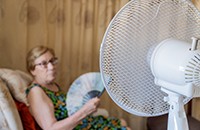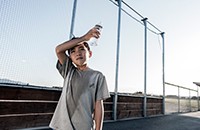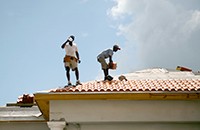Heat Injuries
Anyone is at risk of heat injury if they stay outside too long on a hot day, or stay in areas where there is little or no air conditioning or air circulation. Even short periods of extreme heat -- 90 degrees or more for several consecutive days -- can cause serious health problems if people are not aware or careful.
Preventing Heat Injuries
- STAY COOL. Stay in air-conditioned areas, as much as possible and avoid direct sunlight. Limit outdoor activities to early morning or evening when it is cooler.
- STAY HYDRATED. Drink plenty of water. Don’t wait until you’re thirsty to drink. Limit sugary or alcoholic drinks. Sports drinks can help replensh salt and minerals lost from sweating.
- STAY INFORMED. Stay updated on local weather forecasts so you can plan activities safely when it’s hot outside.
Groups that are at greater risk of developing heat-related illnesses:
- Households without air conditioning
- Infants and young children
- People age 65 years or older
- People who are homeless
- People who are overweight/obese
- People who exercise/play sports outside
- People who have chronic health conditions, especially hear disease or high blood pressure
- People who take certain medications, such as for depression, insomnia or poor circulation
- People who work outside
Air quality and high temperatures
Higher temperatures also heat the air and, under certain conditions, produce ozone, which can affect the health of individuals with respiratory conditions. TCPH's Environmental Health division provides additional information to help residents Be AQI Aware.
Heat-related Illness Dashboard
Tarrant County Public Health conducts syndromic surveillance for heat-related illnesses during the summer and maintains a heat-related illness dashboard. Heat-related deaths are reported to us by the County's Medical Examiner.
Hot Weather Checklists
Do not leave children or animals in parked vehicles
- Children and animals left inside parked cars can be overcome by heat within minutes when outdoor temperatures are high.
- Put your purse, briefcase, wallet or another essential item behind you so you’ll notice your child is there before exiting the vehicle.
- Call 911 immediately if you see an unattended child in a vehicle.
Maintain adequate ventilation / air conditioning
- Stay in cooled environments as much as possible, especially if you have low heat tolerance.
- Some turn off air conditioning, do not run it long, or may not have fans or other devices that help circulate cool air. This practice puts them at risk for heat-related injury.
- Neighbors, friends and family should regularly check on the elderly when temperatures are high for a prolonged time period.
Avoid overexposure
- Anyone outside in high temperatures for prolonged periods is at risk of heat injury, especially those involved in outdoor athletic programs at youth organizations and schools.
- Directors of outdoor programs should carefully monitor participants, ensure that they have plenty of water to drink and allow sufficient time between practice sessions and workouts to cool down.
Watch for signs of heat injury
- Symptoms include heavy sweating, muscle cramps, weakness, dizziness, nausea, weak but rapid pulse and headaches.
- People with these symptoms should find shade, drink water slowly and make sure there is good ventilation; if symptoms don’t improve, seek medical attention.
Additional hot weather tips
- Plan strenuous activities for cooler times of the day.
- Take frequent breaks to cool down if you have to work outside.
- Eat lighter, balanced meals more often.
- Wear plenty of sun block if you are out in the sun, and protect your eyes.
- Do not overdress babies or bundle them in a blanket.
- Consult your doctor if you are taking certain prescription medicines to determine how the sun and heat may affect you.


 TARRANT COUNTY, TX
TARRANT COUNTY, TX

 Public Health
Public Health









